A Star is Born (1976)
Barbra Streisand, Kris Kristofferson. Written by Frank Pierson, John Gregory Dunne, Joan Didion. Directed by Frank Pierson.
 This second remake of A Star is Born is the logical bookend for the collection. In 1937, Janet Gaynor played a rising movie star. In 1954, Judy Garland played a rising star of movie musicals. Now in 1976 Barbra Streisand plays a rising star of pop music, this time as Esther Hoffman instead of Esther Blodgett, with Kris Kristofferson as her alcoholic discoverer, John Norman Howard instead of Norman Maine.
This second remake of A Star is Born is the logical bookend for the collection. In 1937, Janet Gaynor played a rising movie star. In 1954, Judy Garland played a rising star of movie musicals. Now in 1976 Barbra Streisand plays a rising star of pop music, this time as Esther Hoffman instead of Esther Blodgett, with Kris Kristofferson as her alcoholic discoverer, John Norman Howard instead of Norman Maine.
“Are you a figment of my imagination,” John asks the audience as he takes the stage for a live performance, “or am I one of yours?” It’s a great line, practically an epitaph, and John repeats it until it moves past poetry and into cliché, a rather excellent statement about self-destructive rock stars and the relationships they find themselves in all the time, according to VH-1 True Hollywood Stories.
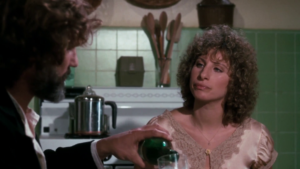 Kristofferson provides the movie something the earlier versions didn’t: a male lead with charisma to tug back against the star. John’s rock-star magnetism and rough road-weariness almost make alcoholism sexy, where in 1937 and 1954 all it did was make men weak. I want to say I disapprove of such representation, but it feels appropriate, and it makes for a much better dynamic.
Kristofferson provides the movie something the earlier versions didn’t: a male lead with charisma to tug back against the star. John’s rock-star magnetism and rough road-weariness almost make alcoholism sexy, where in 1937 and 1954 all it did was make men weak. I want to say I disapprove of such representation, but it feels appropriate, and it makes for a much better dynamic.
John discovers Esther when, after a big concert, he orders his limo driver to take him to the bar where Esther is performing. From the beginning, she’s confrontational and tough. John’s drunken behavior is messing up her gig, and she tells him so right in the middle of her show. When John takes her home after the show and offers to come up, Esther says no, but he’s welcome to show up for breakfast in a few hours if he’s up for it.
 Esther calls the shots in this relationship from the beginning, and while John nudges her onto the stage for her turn in the spotlight, her success, like the successes of the Esther Blodgetts before her, is entirely hers. A star is born; she isn’t made.
Esther calls the shots in this relationship from the beginning, and while John nudges her onto the stage for her turn in the spotlight, her success, like the successes of the Esther Blodgetts before her, is entirely hers. A star is born; she isn’t made.
The music in this incarnation is far better than in 1954, and although Esther’s songs don’t exactly thrill me, she performs them with a sexy stage presence that makes it difficult to turn away. John’s country-flavored rock has the outlaw vibe of Kristofferson’s own music, and my only complaint about his performance is that we don’t get to hear enough of it. Darn alcoholism.
 This remake suffers from some of the same period-related stuff as the first remake. It worships Streisand the actress-singer a bit too adoringly and segues twice into that Seventies staple, the golden sunlight country road long drive music video, complete with lens flares. You see the first one coming a mile away, and the second one is only a surprise because who expects that twice?
This remake suffers from some of the same period-related stuff as the first remake. It worships Streisand the actress-singer a bit too adoringly and segues twice into that Seventies staple, the golden sunlight country road long drive music video, complete with lens flares. You see the first one coming a mile away, and the second one is only a surprise because who expects that twice?
Some of the pacing is also misguided. There are a time and place for candlelit bathtub lovemaking scenes, I suppose, although what they are I can’t tell you. Esther’s fights with John also get tiresome and too long. They love each other but it’s a damaged relationship. We get it.
It’s pretty harsh to blame a 1970s film for being too 1970s, but I blame the 1954 film for being too 1950s, and the enduring films of any era should be called out for their excesses. It’s a fine movie with some definite highlights and a few too many self-indulgences.
6/10
67/100

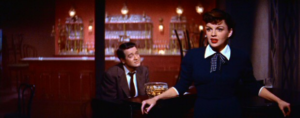 Esther Blodgett is a singer in a band when she meets Norman Maine, a Hollywood star at the very beginning of his career’s decline. Although this 1954 version is my least favorite of the four A Star is Born films, Esther and Norman’s meeting in this one is the best. Norman’s drunk when he wanders onto a stage where Esther and her band are performing. Rather than let Norman be embarrassed, Esther quickly incorporates him into the act, as if he were part of the show.
Esther Blodgett is a singer in a band when she meets Norman Maine, a Hollywood star at the very beginning of his career’s decline. Although this 1954 version is my least favorite of the four A Star is Born films, Esther and Norman’s meeting in this one is the best. Norman’s drunk when he wanders onto a stage where Esther and her band are performing. Rather than let Norman be embarrassed, Esther quickly incorporates him into the act, as if he were part of the show.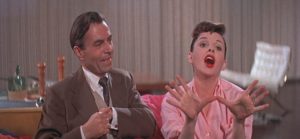 It’s an immediate display of grace, sensitivity, talent, smarts, and self-assuredness that characterizes Esther throughout the film. If only such economy in development could be employed the rest of the way.
It’s an immediate display of grace, sensitivity, talent, smarts, and self-assuredness that characterizes Esther throughout the film. If only such economy in development could be employed the rest of the way.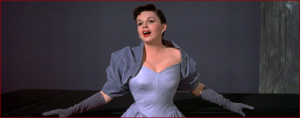 Take out most of the songs, and the film would be a pleasant length, but the filmmakers are determined to make it a comeback tour de force for Garland, who’d been out of movies for four years following the end of her time with MGM.
Take out most of the songs, and the film would be a pleasant length, but the filmmakers are determined to make it a comeback tour de force for Garland, who’d been out of movies for four years following the end of her time with MGM.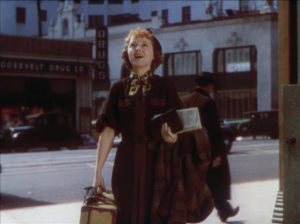 Esther Blodgett is a North Dakota farm girl with dreams of Hollywood stardom. The original A Star is Born movie pretty much begins with her family thinking she’s crazy for even entertaining the notion. Her grandma, however, believes that if you’re willing to risk everything in pursuit of your goals, you have to do it.
Esther Blodgett is a North Dakota farm girl with dreams of Hollywood stardom. The original A Star is Born movie pretty much begins with her family thinking she’s crazy for even entertaining the notion. Her grandma, however, believes that if you’re willing to risk everything in pursuit of your goals, you have to do it.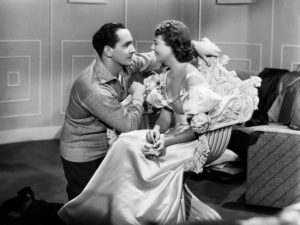 The Esther-Norman relationship drives the film, because while Esther may have needed Norman’s little boost to get through the door, she’s not at all dependent or needy in her relationship with Norman or in any other relationship. Norman clearly needs her far more than she needs him. She just really, really loves him, and he doesn’t quite know how to be loved.
The Esther-Norman relationship drives the film, because while Esther may have needed Norman’s little boost to get through the door, she’s not at all dependent or needy in her relationship with Norman or in any other relationship. Norman clearly needs her far more than she needs him. She just really, really loves him, and he doesn’t quite know how to be loved.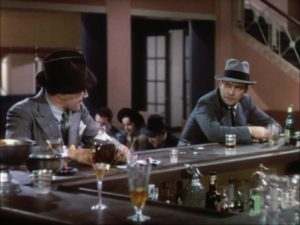 In nearly every way, A Star is Born looks and feels like the popular movies of its time, but with a smart, strong woman taking the lead. Norman is no tragic hero—he’s not a hero at all—but he’s a man loved by a woman. Could his demise have been reversed by a woman like this, or by anyone? The film seems to think not, and as Norman travels along his beautiful, downward spiral, Esther goes along with him because someone has to try.
In nearly every way, A Star is Born looks and feels like the popular movies of its time, but with a smart, strong woman taking the lead. Norman is no tragic hero—he’s not a hero at all—but he’s a man loved by a woman. Could his demise have been reversed by a woman like this, or by anyone? The film seems to think not, and as Norman travels along his beautiful, downward spiral, Esther goes along with him because someone has to try. Kayla is in the last week of eighth grade, where she’s pretty close to invisible and doesn’t seem to have any close friends. Her classmates vote her “Most Quiet,” which bugs Kayla. She doesn’t think of herself as quiet; she doesn’t want to be quiet. She has things to say, but she can’t seem to interest anyone in hearing her.
Kayla is in the last week of eighth grade, where she’s pretty close to invisible and doesn’t seem to have any close friends. Her classmates vote her “Most Quiet,” which bugs Kayla. She doesn’t think of herself as quiet; she doesn’t want to be quiet. She has things to say, but she can’t seem to interest anyone in hearing her. Because most of us were eighth-graders millions of years ago, we’re like Kayla’s dad. We see what a bright, interesting, resilient young woman Kayla is. Unlike Kayla, we also see that the young people around her, the popular kids throwing pool parties at their huge homes and the nerdy cousins and the handsome (barely pubescent) jocks all have their own growing pains.
Because most of us were eighth-graders millions of years ago, we’re like Kayla’s dad. We see what a bright, interesting, resilient young woman Kayla is. Unlike Kayla, we also see that the young people around her, the popular kids throwing pool parties at their huge homes and the nerdy cousins and the handsome (barely pubescent) jocks all have their own growing pains. Kayla takes a foray or two into the world of grownups (read: high-schoolers) where she sort-of experiences the kind of acceptance she longs for. I don’t know what such excursions were like for anyone else, but I imagine Kayla doesn’t see anything especially unusual.
Kayla takes a foray or two into the world of grownups (read: high-schoolers) where she sort-of experiences the kind of acceptance she longs for. I don’t know what such excursions were like for anyone else, but I imagine Kayla doesn’t see anything especially unusual.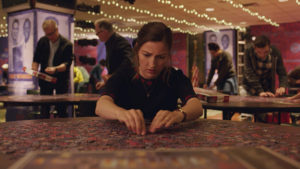 People who know me don’t have to be told I’m predisposed toward liking a movie about a middle-aged homemaker questioning her choices and discovering a love for solving jigsaw puzzles. It’s like this movie was made for me, so take my recommendation with this in mind.
People who know me don’t have to be told I’m predisposed toward liking a movie about a middle-aged homemaker questioning her choices and discovering a love for solving jigsaw puzzles. It’s like this movie was made for me, so take my recommendation with this in mind. A day after a birthday party thrown for Agnes which she seems to have done all the prepping for and cleaning up after, Agnes takes a few moments for herself, apparently a rare occurrence. One friend has given her a jigsaw puzzle as a birthday gift. She spends the day completing it, and then breaking it apart so she can complete it again.
A day after a birthday party thrown for Agnes which she seems to have done all the prepping for and cleaning up after, Agnes takes a few moments for herself, apparently a rare occurrence. One friend has given her a jigsaw puzzle as a birthday gift. She spends the day completing it, and then breaking it apart so she can complete it again.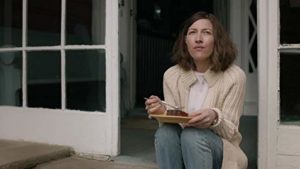 Soon, she is secretly practicing a few times a week with a new puzzle-solving partner—an independently wealthy inventor, recently single, who watches the news all day because he’s fascinated by the destruction.
Soon, she is secretly practicing a few times a week with a new puzzle-solving partner—an independently wealthy inventor, recently single, who watches the news all day because he’s fascinated by the destruction. The Spy Who Dumped Me is not the first female buddy-cop flick, but in the summer of 2018, its existence and moderate success feel like a statement. I was happy to see it just to express my support for such a film, and in fact am disappointed in the title, which refers to a male character who’s pretty much not even in the movie. This is a movie about two friends, not a man who dumps a woman.
The Spy Who Dumped Me is not the first female buddy-cop flick, but in the summer of 2018, its existence and moderate success feel like a statement. I was happy to see it just to express my support for such a film, and in fact am disappointed in the title, which refers to a male character who’s pretty much not even in the movie. This is a movie about two friends, not a man who dumps a woman.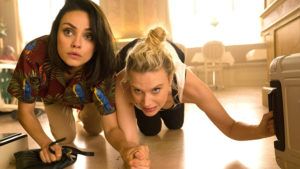 I didn’t care for the violence, which seems to push past gratuitous and into sadistic, and I mean sadistic toward its audience. People come to horrific ends, almost always men and almost always after establishing some kind of rapport with the main characters. Is this also part of the big statement? If it is, there’s probably more going on here than I thought.
I didn’t care for the violence, which seems to push past gratuitous and into sadistic, and I mean sadistic toward its audience. People come to horrific ends, almost always men and almost always after establishing some kind of rapport with the main characters. Is this also part of the big statement? If it is, there’s probably more going on here than I thought. These two younger women are vapid and giggly. Are Audrey and Morgan looking at their former selves, kind of disgusted with what they see but experienced enough to manipulate it? Or are they looking at the idea of young women in movies, nearly completely useless in a genre almost always dominated by men?
These two younger women are vapid and giggly. Are Audrey and Morgan looking at their former selves, kind of disgusted with what they see but experienced enough to manipulate it? Or are they looking at the idea of young women in movies, nearly completely useless in a genre almost always dominated by men? I never saw 2014’s The Equalizer, so The Equalizer 2 is completely fresh snow for me, and it’s not bad if you don’t mind your snow a little on the vindictive side.
I never saw 2014’s The Equalizer, so The Equalizer 2 is completely fresh snow for me, and it’s not bad if you don’t mind your snow a little on the vindictive side.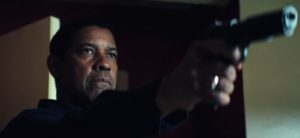 Someone close to McCall is murdered, and there (apparently) aren’t very many people close to McCall, so he goes after the people responsible, only he doesn’t know who these people are. At first.
Someone close to McCall is murdered, and there (apparently) aren’t very many people close to McCall, so he goes after the people responsible, only he doesn’t know who these people are. At first. Alas, the film is directed by Antoine Fuqua, and I haven’t seen all of his movies with Denzel, but I’ve seen Training Day, a film I disliked because Denzel hams it up like an Easter brunch. Thankfully, there are only a couple of offending scenes like this here, but there was a moment where I was half-certain McCall was about to proclaim at the top of his lungs that King Kong ain’t got s*** on him. I tolerated these couple of scenes because I like the rest of this film just fine.
Alas, the film is directed by Antoine Fuqua, and I haven’t seen all of his movies with Denzel, but I’ve seen Training Day, a film I disliked because Denzel hams it up like an Easter brunch. Thankfully, there are only a couple of offending scenes like this here, but there was a moment where I was half-certain McCall was about to proclaim at the top of his lungs that King Kong ain’t got s*** on him. I tolerated these couple of scenes because I like the rest of this film just fine. Picture a world like the one in Who Framed Roger Rabbit? but instead of humans and toons, the world is cohabited by humans and puppets with serious discrimination against puppets. This is the world in which The Happytime Murders is set, only instead of some made-up town, we are right in Los Angeles with all its glamour and sleaze.
Picture a world like the one in Who Framed Roger Rabbit? but instead of humans and toons, the world is cohabited by humans and puppets with serious discrimination against puppets. This is the world in which The Happytime Murders is set, only instead of some made-up town, we are right in Los Angeles with all its glamour and sleaze.
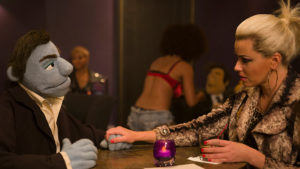
 It’s difficult to know how to feel about what happens to Rick Wershe, Jr. at the end of White Boy Rick, and this makes it difficult to decide how I feel about the movie. Do we care more about justice in the eyes of the law, or justice according to a sense of right and wrong, and how do Rick’s choices stand up to either standard? If the film wants us to take a side, I can’t tell which it is.
It’s difficult to know how to feel about what happens to Rick Wershe, Jr. at the end of White Boy Rick, and this makes it difficult to decide how I feel about the movie. Do we care more about justice in the eyes of the law, or justice according to a sense of right and wrong, and how do Rick’s choices stand up to either standard? If the film wants us to take a side, I can’t tell which it is.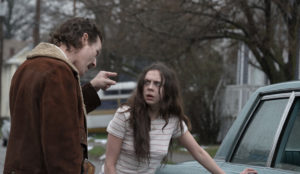 This makes me dissatisfied with the film, which is a disappointment because I like and care about this character, and Richie Merritt as White Boy Rick does a nice job playing him. Guided by a sense that life is ripping him off but feeling empowered to do something about it, Rick is suspicious of his father’s optimistic outlook and unsure what to do about a junkie older sister whom he cares very deeply about.
This makes me dissatisfied with the film, which is a disappointment because I like and care about this character, and Richie Merritt as White Boy Rick does a nice job playing him. Guided by a sense that life is ripping him off but feeling empowered to do something about it, Rick is suspicious of his father’s optimistic outlook and unsure what to do about a junkie older sister whom he cares very deeply about. It’s fairly easy to read Rick Sr.’s moral code, but Rick Jr.’s is still being formed. Which of his bad decisions are mere errors in judgment and which are dictated by a slightly skew sense of right and wrong? I’m okay with a movie whose position differs from mine on this, but the movie doesn’t seem to take a position, taking some of the power out of some very good performances.
It’s fairly easy to read Rick Sr.’s moral code, but Rick Jr.’s is still being formed. Which of his bad decisions are mere errors in judgment and which are dictated by a slightly skew sense of right and wrong? I’m okay with a movie whose position differs from mine on this, but the movie doesn’t seem to take a position, taking some of the power out of some very good performances. At first I didn’t quite see what the critics were reporting, that Glenn Close’s performance in The Wife was sure to earn her a nomination for a Best Actress Oscar. Close is pretty much always very good, and this role of Joan Castleman didn’t seem to stretch her at all. Sure, there are some pretty fiery moments where Joan and her husband Joe Castleman argue almost to the point of throwing blows or objects, but this stuff is a cakewalk to someone of Close’s talent.
At first I didn’t quite see what the critics were reporting, that Glenn Close’s performance in The Wife was sure to earn her a nomination for a Best Actress Oscar. Close is pretty much always very good, and this role of Joan Castleman didn’t seem to stretch her at all. Sure, there are some pretty fiery moments where Joan and her husband Joe Castleman argue almost to the point of throwing blows or objects, but this stuff is a cakewalk to someone of Close’s talent. Then there’s the last act of the film, where Joan’s barely controlled fury threatens to blow everything in the room to pieces, and it’s an amazing thing to witness. She is certain to be nominated for best actress, and she’s going to be among the favorites to win.
Then there’s the last act of the film, where Joan’s barely controlled fury threatens to blow everything in the room to pieces, and it’s an amazing thing to witness. She is certain to be nominated for best actress, and she’s going to be among the favorites to win. Joe is informed in the first scene that he is this year’s winner of the Nobel Prize for Literature. The movie then alternates between its present day and the early days of the Castlemans’ relationship. This is a movie about Joan’s role in Joe’s literary career, which includes the raising of two children—a well-adjusted adult daughter and a troubled adult son, who accompanies his parents to Stockholm for the awards ceremony.
Joe is informed in the first scene that he is this year’s winner of the Nobel Prize for Literature. The movie then alternates between its present day and the early days of the Castlemans’ relationship. This is a movie about Joan’s role in Joe’s literary career, which includes the raising of two children—a well-adjusted adult daughter and a troubled adult son, who accompanies his parents to Stockholm for the awards ceremony.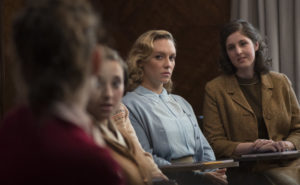 It’s a pretty good story, but the reason to see it is the acting, which is excellent without being especially pyrotechnic. I was really pleased to see Christian Slater as a wanna-be biographer tailing the Castlemans despite their open dislike of him. Slater brings his slimiest best, all the sneaky, sleazy acting that made him a Gen X icon, minus the rebellious self-righteousness. I won’t be surprised if there’s some supporting actor love for him at Oscar time.
It’s a pretty good story, but the reason to see it is the acting, which is excellent without being especially pyrotechnic. I was really pleased to see Christian Slater as a wanna-be biographer tailing the Castlemans despite their open dislike of him. Slater brings his slimiest best, all the sneaky, sleazy acting that made him a Gen X icon, minus the rebellious self-righteousness. I won’t be surprised if there’s some supporting actor love for him at Oscar time.